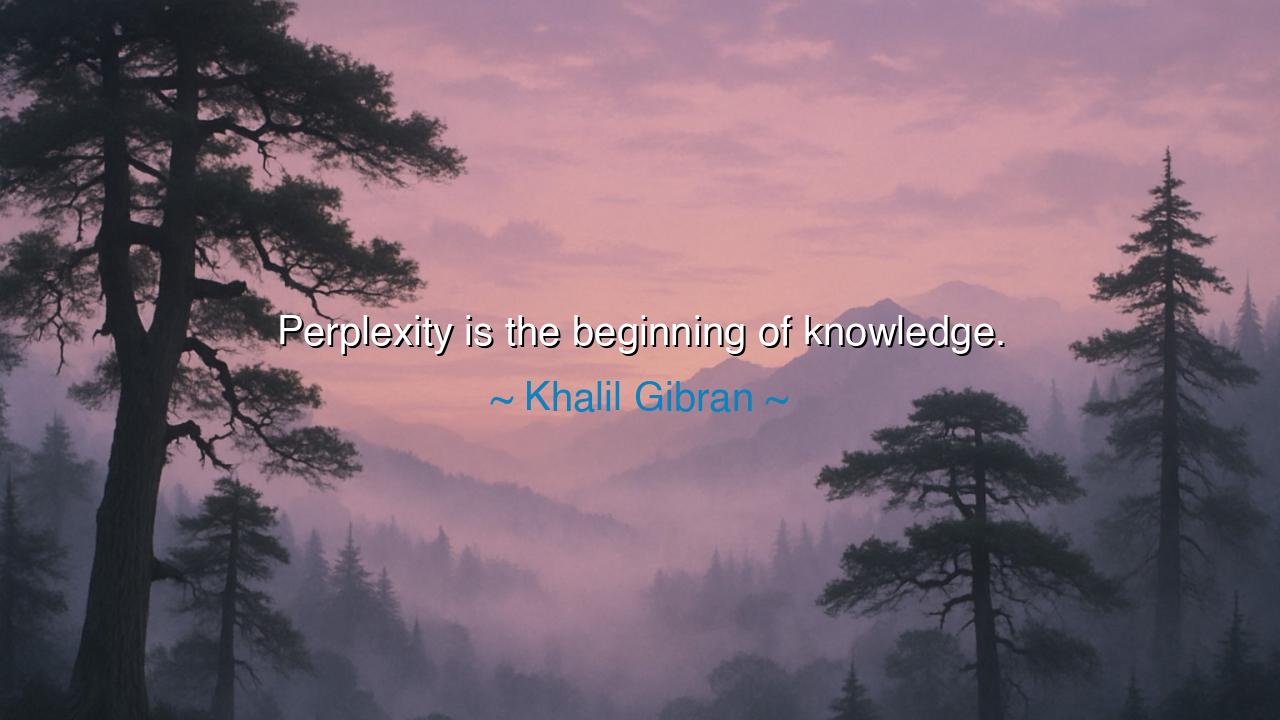
Perplexity is the beginning of knowledge.






“Perplexity is the beginning of knowledge.” — Khalil Gibran
Hear these words, O seeker of wisdom, for in them Khalil Gibran, the poet of the soul, reveals one of the quiet mysteries of human understanding. When he says that perplexity is the beginning of knowledge, he teaches that confusion, doubt, and uncertainty are not enemies of learning but the very soil from which wisdom grows. To be perplexed is to stand at the threshold of discovery — to gaze into the unknown and feel the stirring of curiosity, the sacred unrest that drives the mind toward truth. Those who fear confusion close the gates of understanding; those who embrace it open the doors to enlightenment.
The origin of these words lies in the heart of Gibran’s philosophy, a union of Eastern mysticism and Western reason. He believed that the human spirit grows not in comfort, but in questioning. To be perplexed is to admit that what one knows is incomplete — and that humility is the first step toward wisdom. In his life and writings, Gibran wrestled with the great paradoxes of existence: love and loss, faith and reason, joy and suffering. From this inner struggle was born his insight that knowledge does not begin with clarity, but with confusion. The wise man does not say, “I understand,” but, “I seek to understand.” For in the stillness of unknowing, the light of truth begins to dawn.
Think of the mind, O listener, as a flame. It is not sparked by certainty, but by wonder — by the friction of doubt against belief. When we encounter what we cannot explain, our thoughts ignite and our hearts awaken. The scientist, the philosopher, the poet — all begin their journeys in perplexity. It is the sacred tension between ignorance and insight, between question and revelation. To feel lost is not failure; it is the soul’s signal that there is more to be found. Those who claim to know all have ceased to grow; those who admit their confusion have begun to learn.
Consider the story of Socrates, the ancient sage of Athens, who declared that he was the wisest man only because he knew that he knew nothing. The others around him were certain of their truths, yet they could not withstand his questions. Through perplexity, Socrates revealed to them the limits of their understanding, and in that moment, they stood closer to wisdom than before. His method — to ask, to doubt, to question — was the embodiment of Gibran’s truth: that confusion, far from being a weakness, is the forge in which knowledge is shaped.
So too has every discovery in human history been born from perplexity. When Isaac Newton saw the apple fall, it was not an ordinary sight that moved him — it was the question that followed. Why does the apple fall downward and not upward? That single moment of wonder led him to uncover the law of gravity, a truth that changed the world. Had he dismissed his confusion, had he been content with the obvious, the heavens would have remained silent. Thus, it is perplexity — not complacency — that opens the way to revelation.
The lesson is clear: do not flee from confusion, for it is the seed of wisdom. When life bewilders you, when the world seems uncertain, know that you stand at the gateway of understanding. Sit with your questions; let them trouble you, shape you, and lead you forward. The greatest minds in history were not those who had all the answers, but those who had the courage to ask the hardest questions. Perplexity is the voice of curiosity calling you to grow.
So, my child, when you find yourself lost in doubt, rejoice — for you are not falling, but ascending. Every question you ask is a step toward light. Embrace your confusion, for it humbles the mind and sharpens the spirit. Do not rush to silence the mystery; let it teach you. For as Khalil Gibran said, “Perplexity is the beginning of knowledge.” The one who never questions will never learn, but the one who faces confusion with courage will find that beyond every uncertainty lies a greater truth, waiting patiently to be revealed.
Thus, let your perplexity be your compass, and your humility, your guide. The road to wisdom begins not with certainty, but with wonder — and those who dare to walk it will find that even the fog of confusion is lit by the flame of awakening.






AAdministratorAdministrator
Welcome, honored guests. Please leave a comment, we will respond soon